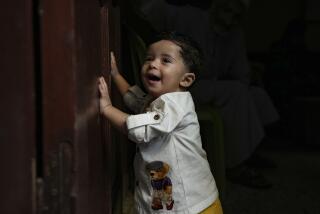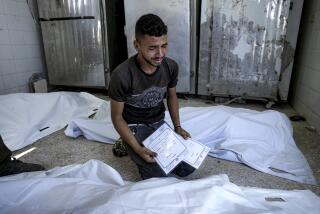Let’s Talk About Iraq Losing Its Innocents
- Share via
At 7:30 this morning, a 3-year-old girl was scheduled for routine surgery at Children’s Hospital of Orange County. She has a name you won’t remember and is from a town you’ve never heard of. A pediatric surgeon was expected to need a couple hours to bolster the girl’s abdominal wall.
There’s no particular need to be worried about her condition, unless it bothers you that she most likely was injured by a shell from a U.S. tank in Iraq. Or that it happened, according to her father, as she and other children were having a tea party.
The Los Angeles man who spearheaded the effort to bring the girl here says the incident occurred last May as U.S. troops were fighting insurgents in the town of Al Qaim near the Syrian border.
This newspaper’s reports last May described the town as part of a cluster of insurgent strongholds, prompting a strong Marine presence. A Times story quoted a local Iraqi as saying he didn’t like the Americans’ presence but disliked even more the threat from the foreign terrorists. A Marine on the scene told our reporter that no civilians had been killed, but the injured girl’s father disputes that. He told the Orlando Sentinel last year that the explosion killed two of his children and three others.
My intention today isn’t to argue the war or rehash why we got into it or predict how it will end.
It’s to wonder aloud why, in our national discussion about it, we never seem to talk very much about the innocent Iraqis who have died because of it.
I’m no pacifist. At the war’s outset, I was a fence-sitter. But isn’t it fair to ask -- considering it’s a war whose value and rationale are now so hotly debated -- why we so seldom hear about civilian casualties?
What happened to our national conscience? What happened to our willingness to discuss unpleasant things like injured children in a country we chose to attack?
Tackling the subject wouldn’t even mean that any of us would have to decry the war. A discussion of it might lead to the conclusion that civilian -- including children -- casualties are of course deplorable, but an inevitable result of war.
But how many of us have taken time to do that?
President Bush finally put a figure on civilian deaths in December: 30,000. Other groups have said a more realistic figure is a multiple of that, but let’s accept the president’s number. Then let’s factor an unknown number of thousands of injured.
Including children at a tea party.
Cole Miller is the Los Angeles freelance writer who organized the Iraqi girl’s trip to America. Her first stop was an Orlando, Fla., hospital, where she had shrapnel removed from both eyes. A doctor there knew Ali Kavianian, who will do the surgery at CHOC.
In an interview with the Orlando newspaper in November, the girl’s father said he appreciated the efforts of various Americans to help her but felt compelled to identify U.S. troops as the source of the blast. He said they were the only ones with the firepower to do the kind of damage done to his home.
Miller, who says he opposes all wars, thinks Americans haven’t focused on Iraqi civilian deaths because TV hasn’t shown them. The war remains a faraway distraction to many Americans, already consumed with the rigors of daily life, he says.
I think it’s more fundamental. As a decent society that links its historic identity to its goodness, we don’t want to contemplate our bombs killing children in a war whose underpinnings have shifted.
This isn’t pleasant stuff to think about. It becomes less pleasant as the reasons for getting in and the prospects for getting out grow less certain.
Fact is, no one knows if our best hopes for Iraq will pan out. From what I can tell, it could go either way. The proverbial flip of a historical coin.
Is that good enough for us, as we contemplate injured children?
Oh, the girl’s name?
In case you’re interested, it’s Alaa’ Khalid Hamdan.
*
Dana Parsons can be reached at (714) 966-7821 or at dana.parsons@latimes.com.
More to Read
Sign up for Essential California
The most important California stories and recommendations in your inbox every morning.
You may occasionally receive promotional content from the Los Angeles Times.













